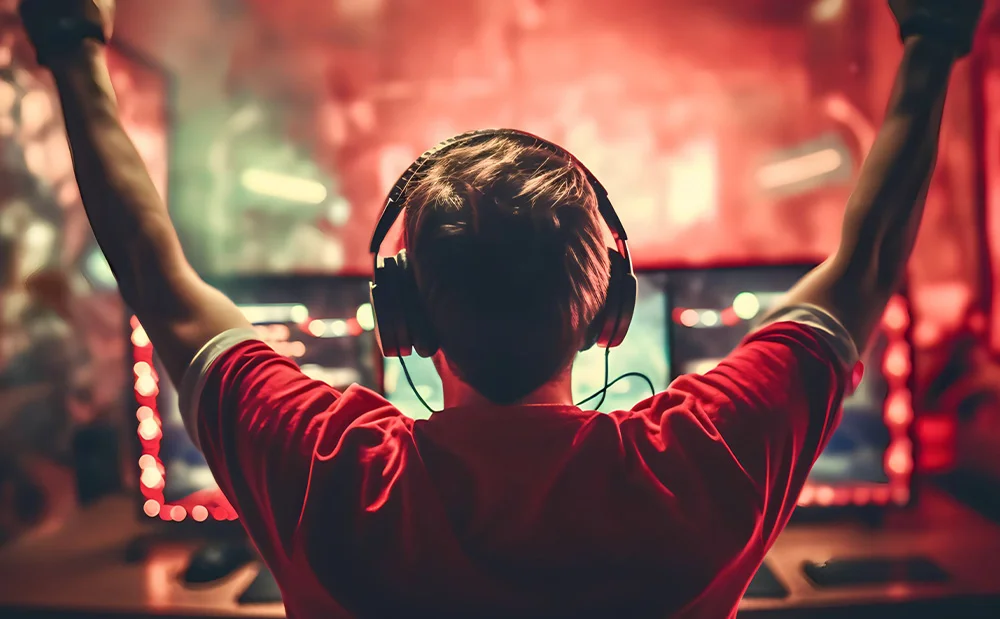
Any esports athlete will tell you — there are video games, and then there are video games. Esports, for those not familiar, is a highly competitive environment in which “athletes” (and those quote marks are debatable) engage in a virtual reconstruction of physical sports, shooter games, and team-oriented battles, according to Harvard (1). So, it begs the question, how could a recent study have found that this virtual sport could have physical impacts on the players’ bodies? The lines between the virtual and physical world blur, new research found (2).
In the study, researchers point out that the sedentary nature of the “athletes” engaging in video game competitions has led to several health concerns, as have the repetitive motions that they engage in on their controllers. They have an increased risk of hand, wrist, neck, and back problems, researchers said, in addition to eye strain and venous thromboembolism.
They also have an interesting sleep issue — insomnia. It adds to the body of research on the topic, including a 2021 study, that found that esports can negatively impact sleep by prolonging wake time and participants typically get less than 7 hours of sleep at night, leading to increased chances of depression or mood disorders (3).
Another 2022 study from Norway found that esports performance had an impact on the sleep had by players (4). Those who felt their performance was good during esports competitions slept better than those whose performance was poor. Another 2021 study found daytime sleepiness and fluctuating sleep routines amongst esports players (5).
Jessica Addeo, occupational therapist and nervous system clinician in Waldwick, N.J., explains how this might be so.
“Esports can be quite confusing for the nervous system. On the one hand, your brain is very stimulated by the visual input it receives as well as the excitement level of the game. Depending upon the particular sport/game a person likely trips off their fight/flight response. However, the body is primarily still,” she says. “When a nervous system is activated into fight or flight it needs to move that energy through its system to become regulated again.” She goes on to explain that this can “trick” the brain and can cause a person to have trouble with regulation in a variety of directions.
Addeo explains that when you have that fight or flight response, but your body remains still, insomnia is a likely result. “Without that mobilizing energy being given the opportunity to move elsewhere, your system stays heightened. This can make it incredibly hard to shift gears into sleep,” she says. In addition, that sedentary position exacerbates the problem, she says. “You are getting little sensory input into several of your sensory systems. Your auditory and visual system may be getting lots of input from the esport, but your body is mostly still. This means you have minimal proprioceptive and vestibular input. Your body may start to struggle to understand where it is in space, and this sets off a whole separate set of reactions in one’s nervous system.”
She equates the problem to the disconnect two people who need, but aren’t wearing, their hearing aids might feel. “No one knows what the other is saying… Balancing the scales here will make this conversation between your brain and body more fluid.” So, how can esports athletes, and others who love video games, do this?
Addeo says that the answer is to get some physical movement in addition to the effort you put into virtual movements.
“To the best of one’s ability, add movement back in. Your brain already thinks you are moving a ton via all of the visual stimulation, but your body isn’t moving much at all,” she says. Listening to your body is the first step in finding out when and how this might need to happen. But that step in itself might not come naturally to everyone.
“In the same way a person practices and dedicates themself to their craft, esports in this case, one needs to spend time practicing checking in with their body. It may even require professional guidance if ‘listening to your body’ feels completely foreign. Even something as simple as rolling one’s head and neck can provide a quick dose of sensory input — via the vestibular system — that can help bring awareness of the felt sense of one’s body back on board.”
In addition to physical and sleep-related concerns, she adds that parents in particular should keep an eye out for issues with social interactions in person with “regular 3-dimensional people.” “If you train your brain to expect this high level of intense sensory input (through frequent and consistent exposure) it can be difficult to attend for long periods without it. This can make social interactions and learning experiences more challenging for these individuals.” With a little know-how about how video games impact sleep, you can get back to enjoying and benefitting from both.
Sources
1. Leroux-Parra, Marc. “Esports Part 1: What are Esports?” Harvard International Review; https://hir.harvard.edu/esports-part-1-what-are-esports/; April 24, 2020.
2. Pirklova, Karolina; “AFK! : Injury prevention and performance interventions for esports players,” Theseus; https://www.theseus.fi/handle/10024/810197; 2023.
3. Lee S, Bonnar D, Roane B, Gradisar M, Dunican IC, Lastella M, Maisey G, Suh S. Sleep Characteristics and Mood of Professional Esports Athletes: A Multi-National Study. Int J Environ Res Public Health. 2021 Jan 14;18(2):664. doi: 10.3390/ijerph18020664. PMID: 33466788; PMCID: PMC7830734.
4. Frode, Vatn Marte, Olsen Maja, Haugan Jan Arvid, Skalicka Vera; “Sleep Characteristics in Esport Players and Associations With Game Performance: Residual Dynamic Structural Equation Modeling,” Frontiers in Sports and Active Living; Volume 3; https://www.frontiersin.org/articles/10.3389/fspor.2021.697535; 2022
5. Sanz-Milone, V., Yoshinori, P., & Maculano Esteves, A. (2021). Sleep quality of professional e-Sports athletes (Counter Strike: Global Offensive). International Journal of Esports, 1(1). Retrieved from https://www.ijesports.org/article/45/html
Addeo, Jessica. Author interview. January 2024.

























